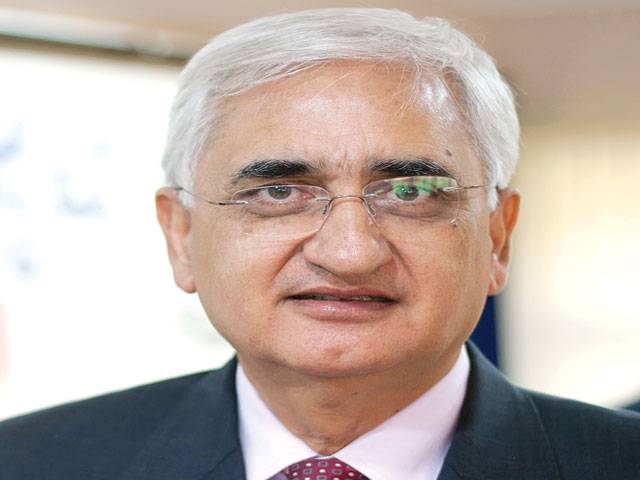ISLAMABAD - India’s former External Affairs Minister Salman Khurshid said yesterday that Prime Minister Narindra Modi has to learn how to reach out to neighbours stating that the current Indian prime minister failed to capitalise on the peace overtures of his Pakistani counterpart Nawaz Sharif.
Mr Khurshid, who arrived in Pakistan on Thursday to participate in Jinnah Institute’s Distinguished Speaker Series here, accused Premier Modi for his disastrous communal approach at the cost of marginalising minorities in India.
Comparing Modi with his Pakistani counterpart Nawaz Sharif, the former Indian minister said Mr Sharif proved to be quick, genuine and far sighted in reaching out to India to participate in oath-taking ceremony of Premier Modi in May 2013.
“Premier Sharif proved to be courageous, brave and far-sighted when he attended Modi’s oath-taking ceremony. In my view, Mr Sharif is the first elected Pakistani Prime Minister who was genuine in making peace with India. But Modi did not reciprocate positively,” Mr Khurshid told the gathering that was attended by Pakistani lawmakers and foreign diplomats.
He said India has not responded to Pakistan’s overtures for peace in South Asia the way it should have adding that Modi of Bharataya Janta Party (BJP) was habitually against peace efforts.
The former Indian minister recalled when the then ruling Congress embarked on resolving border issue with Bangladesh, the BJP, then in opposition, tore apart the proposals. “But now the BJP reached out to Bangladesh for resolving border dispute,” he said.
He maintained that the BJP led-government in India failed to reciprocate Islamabad’s peace overtures. “Since 1947 the world had found solutions to several intractable disputes and conflicts, while India-Pakistan confrontation remained largely unchanged,” he regretted.
While Salman Khurshid sounded optimistic about a thaw in Indo-Pak relations, he said India should not hurt democracy in Pakistan in case New Delhi started to make peace efforts with Islamabad.
He said the electoral defeat in Bihar for BJP was strong evidence that people in India had rejected the communal approach adopted by Premier Modi.
Appreciating the steps taken by Pakistan in its fight against terror, Mr Khurshid said the scourge of terrorism had not spared Islamabad too. “A stable and successful Pakistan is in India’s interest, and vice-versa. India has a stake in the success of Pakistan far greater than the usefulness of a counterargument against its initial conception,” he maintained.
Responding to a question, the former external affairs minister of India said the violence against minorities in India during the current BJP regime will isolate Modi internationally. And at the same time he appreciated Prime Minister Nawaz Sharif’s positive remarks to the Hindus in Pakistan on the occasion of Diwali.
Answering a query regarding what steps should be taken to normalise the growing tension between the two countries, Mr Khurshid suggested that leaders and opinion-makers from both countries should write in each other’s newspapers so that masses in both countries could know the good wishes or each other.
He said only a few Indians know that Premier Sharif had extended good wishes to Hindu community in Pakistan on the occasion of Diwali mainly because the media too was aggressive in the aftermath of BJP’s beating of war drums.
While he criticised the BJP regime in India, Mr Khurshid urged Pakistanis not to look at India as merely a Hindu state arguing that India was home to more Muslims than Pakistan itself. He said by 2020, India would have a larger Muslim population than either in Indonesia or Pakistan. “And we are proud of its secular ethos,” he said.
He was also of the opinion that divided families from either side of the border should be allowed multiple entry visas to facilitate travel.
Speaking on the occasion, President Jinnah Institute and former ambassador to the United States Senator Sherry Rehman noted that there were as many roads to peace and stability as there were to war and conflict in South Asia.
On the foreign policy front, she said it still remained to be seen whether New Delhi had a clear policy on Pakistan. In contrast, political parties across-the-board in Islamabad were unequivocal and on the same page when it came to making peace with India.
She warned, however, that the strong public consensus in Pakistan for improved relations with India was breaking down due to conditionality and stark messaging by New Delhi.
Sherry said the track 2 exchanges between Pakistan and India were critical because of the cognitive disconnect between the two sides. Simultaneously, a new generation of youngsters in both countries was busy constructing new identities and ideas of themselves and their neighbour.
She further asserted that there were no fireworks in Pakistan following November’s Bihar election; indeed Pakistan was facing its own slate of difficult challenges.
Indian High Commisisoner in Islamabad Dr TCA Raghavan and his spouse was also present on the occasion.
Thursday, April 18, 2024
Indian ex-FM slams Modi for declining Pak peace overtures
| Salman says Indians have rejected communal approach adopted by BJP govt

9:07 PM | April 18, 2024
9:05 PM | April 18, 2024
Mehwish Hayat says she would like to work with Aamir Khan
9:59 PM | April 18, 2024
'That'll be awesome,' Rohit Sharma on idea of Pakistan vs India Test series
9:17 PM | April 18, 2024
Turkiye commends Pakistan's efforts in fostering regional peace
9:03 PM | April 18, 2024
CM Maryam's security squad hits biker to death in Narowal
9:02 PM | April 18, 2024
Hafiz Naeemur Rehman sworn in as new emir of Jamaat-e-Islami
8:54 PM | April 18, 2024
Hepatitis Challenge
April 18, 2024
IMF Predictions
April 18, 2024
Wheat War
April 18, 2024
Rail Revival
April 17, 2024
Addressing Climate Change
April 17, 2024
Justice denied
April 18, 2024
AI dilemmas unveiled
April 18, 2024
Tax tangle
April 18, 2024
Workforce inequality
April 17, 2024
New partnerships
April 17, 2024
ePaper - Nawaiwaqt
Advertisement
Nawaiwaqt Group | Copyright © 2024





